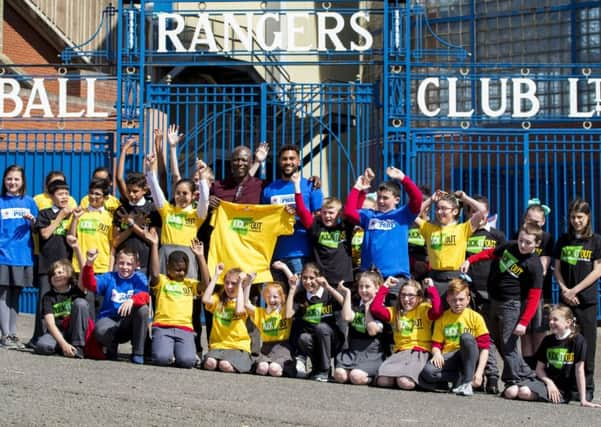Wes Foderingham's '˜disgust' over racist attacks on Sinclair


The Rangers goalkeeper has now revealed his “disgust” when he found out it had taken place behind his back at Ibrox just over a week ago.
Foderingham only learned about the monkey gestures directed at Celtic winger Scott Sinclair in the aftermath of the Old Firm Premiership fixture. The two men involved have already been handed indefinite bans by Rangers, while club sources yesterday confirmed similar action has been taken against two season-ticket holders who loaned the offenders their tickets on the day. As an ambassador for the Kick It Out organisation, founded in 1993 to tackle racism and discrimination in football, Foderingham was pleased to see his own club enforce such swift measures.
Advertisement
Hide AdAdvertisement
Hide Ad“I didn’t know about it until after the game and found out through social media and the rest of it,” he said. “I was disgusted and thought it was terrible. It’s one or two fans who have ruined the atmosphere. They have ruined the game and it’s the one or two who have tarnished the fans. The majority of the Rangers fans don’t condone it. Rangers, as a club, don’t condone it and neither do the players. The individuals have been dealt with by the club and, hopefully, it’s just an isolated situation.
“It’s surprising to see it in this day and age but it’s been dealt with accordingly and what we don’t want to happen is for it to reflect on Rangers in any way shape or form. The club does a lot of work in the community to try to raise awareness through the Follow With Pride initiative.
“I haven’t spoken to Scott about what happened but I’m sure he’s upset about it. It’s a difficult thing to deal with and I hope he is okay. It happened behind my goal but, if there is a bit of hope, it’s that it’s an isolated incident. It’s one or two fans who’ve maybe had too much to drink and gone a step too far but we need to deal with it and the club has dealt with it. It’s a positive that the club acted so quickly and taken the action that they did. You don’t want to see this type of thing in sport or society. The club have done the correct thing by dealing with it quickly.
“The first time I ever experienced racism personally was after I had played a game for Swindon at Morecambe in 2012. It was after the game, I was walking back to the coach and this lad, who was no more than 16, shouted ‘Go back to your own country’. I was born in England, in London. I was angry but I didn’t act angry towards him. I didn’t approach him in a confrontational manner. I was a little bit shocked at the time and unsure how to handle it.
“I just asked him what he was thinking and he couldn’t give me an answer. It was difficult to deal with it at the time and, until something like that happens to you, I don’t think you can know how you will react. I reported what happened to the groundstaff and the coaching set-up. But if something did happen to him beyond that, I didn’t hear about it.”
Foderingham was speaking at Ibrox where he helped former Charlton, Aston Villa and Crystal Palace midfielder Paul Mortimer, now Kick It Out’s Professional Players’ Engagement Manager, deliver an anti-discrimination workshop to pupils from St Saviour’s Primary School in Govan.
“About six to eight months after the incident at Morecambe I was approached by Paul who asked me if I wanted to come on board and I was delighted to,” said Foderingham. “We go and visit schools and football clubs to try to raise awareness and it’s been brilliant. That day at Morecambe was the only time I have personally experienced racism on a football pitch and, since I’ve moved up to Scotland, the fans have been brilliant. It’s about tackling the minds of the younger generation, to try to educate them on equality both within sport and within society as well. It’s something which is working well.”
Asked what he would say to the offenders who made the gestures at Sinclair, Foderingham replied: “I’d ask them what they were thinking. I’m sure they couldn’t even tell you what they were thinking. Without raising awareness and speaking about it openly, you are never going to get an answer. There have been massive strides and improvements made in the last 50 years and I hope that continues. I wouldn’t say it is a massive problem, especially up here in Scotland. Since I have been here, that is the only situation I have seen. But you can see the impact it has. All it takes is one fan. Growing up in London, I lived in a multi-cultural city and a multi-cultural environment so I didn’t have any racism thrown my way. In football, great strides have been made to get rid of it and hopefully that continues.”